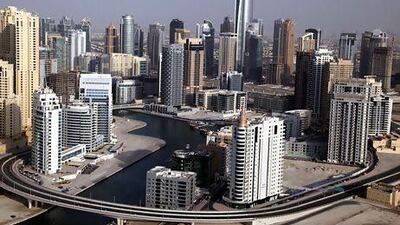Inflation is flaring up across the GCC and economists expect it will continue to do so for the rest of the year, propelled by higher housing costs.
Food prices have played a key part in the recent price spike, but looking ahead, it is housing that the economists believe will feed longer-term structural inflation.
"With the region's residential real estate market recovery expected to continue apace, higher housing costs will likely be a key factor pushing headline CPI [consumer price index numbers] up through the remainder of 2013," wrote Jean-Paul Pigat, economist at Emirates NBD, in a research report this week.
Emirates NBD forecasts UAE inflation to reach 2.5 per cent this year, up from 0.7 per cent last year and the highest since the double-digit levels of 2008.
Across the GCC, it expects inflation to reach 3.8 per cent this year, compared to 2.7 per cent last year.
The uptick follows a period of subdued inflation in the UAE and Qatar, ever since the global financial crisis tightened the availability of credit and weakened the property markets. Inflation has remained higher in Saudi Arabia and other states.
More recently, GCC economies have gathered fresh momentum, underpinned by strong government spending and housing demand from rising populations.
On average, housing costs account for about 27 per cent of the consumer price index, the largest weighting in the basket. Food prices, which have also been fanning inflation, make up 20 per cent of the basket.
In the UAE, the annual inflation rate reached 1.3 per cent last month, its highest level since July 2011, according to data released by the National Bureau of Statistics this month. Housing and utility costs rose 0.4 per cent from a year earlier. Food and soft drinks accelerated by 3.5 per cent during the month.
The rise reflects a recovery in the property market, especially in Dubai, where rents are estimated by the property broker CBRE to have jumped by more than 30 per cent over the past year.
In Saudi Arabia, housing price inflation rose to a 16-month high of 4.2 per cent a year last month, showed data from the kingdom's Central Department of Statistics and Information. Housing and related items had climbed 3.3 per cent in the year to date.
Ramadan helped to lift food inflation to a four-year high of 6.9 per cent during the month from a year earlier. Overall inflation rose to 3.7 per cent.
"While this increase in rental inflation partly reflects a seasonal trend during summer months, we maintain our view that higher consumer incomes are putting upward pressure on rents at a time when the bulk of anticipated new supply has still to balance the market," wrote Fahad Alturki, head of research at Jadwa Investment, the Saudi Arabian investment bank, in a report released last week.
Housing prices are also on the rise in Qatar, although for different reasons.
Prices have been driven up by an influx of foreigners to work on the raft of big infrastructure projects Qatar is pushing ahead with, including the 2022 Fifa World Cup.
Rental inflation climbed to 6.7 per cent in the year to June, according to Qatar Statistics Authority. It follows a period of negativity in the weighting almost every month from early 2009 to the middle of last year.
In a research report released this month, Qatar National Bank said it expected the nation's inflation to reach 3.6 per cent this year and 3.8 per cent next year due to further increases in rents as major projects ramped up over the next year or so.
Bahrain is facing similar pricing pressures.
Rents in the kingdom have grown sharply by 9.3 per cent so far this year. A return of political stability since unrest in 2011 and last year has helped to give upward momentum to the property market.
In Kuwait, rents have risen by 3.2 per cent on average this year.
Of the GCC countries, only Oman has seen more moderate rental price pressure. Prices have gained 1.2 per cent in the year to date.
QNB says it expects the region's inflation to find a floor at around 3 per cent. "Strengthening non-oil growth and expanding populations will give prices, particularly rents, some upward impetus. However, this is likely to be counterbalanced by falling global food prices, which will make food imports cheaper and hold back inflation," analysts wrote in the research report.

